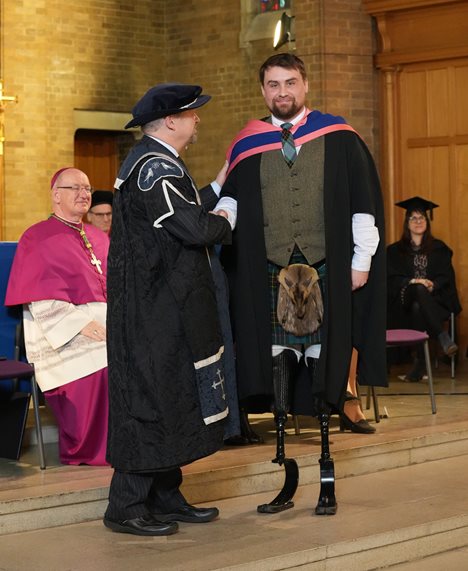Chris served as a US Marine Infantry Machine Gunner with 2nd Battalion 7th Marines Regiment in Afghanistan, 2008. He lost both of his legs below the knee due to wounds sustained in the explosion of a Taliban IED. He spent many years recovering and after retiring from the Marines, he began a life of academic study, earning a BA in Creative and Professional Writing and an MA in Creative Writing: First Novel at St Mary’s. Chris produced and starred in the 2020 documentary The Forgotten Battalion, which focused on the aftereffects of war and the suicide epidemic which plagued his unit. He recently published his debut novel, Upgunner, which has become an Amazon bestseller. Chris is now pursuing a PhD in Creative Writing at St Mary’s.

Can you tell us about your upbringing in Alaska and how that shaped your path to becoming a US Marine?
I grew up on the Kenai Peninsula, Alaska, in a place where there were probably more bears and wolves than people. You have to be tough growing up in such a wild place and I suppose that is part of the reason that when I chose to join the military, I wanted the hardest and picked the Marine Corps Infantry.
What drew you to St Mary’s to pursue a MA in Creative Writing?
I chose St Mary's for several reasons. Being a Catholic institution was important to me, but what really stood out was the strength of its Creative Writing programme. Plus, the university’s location, close to some of the best fishing spots on the river Thames, was a bonus! I thoroughly enjoyed both my BA and MA here, and I feel privileged to now be continuing my academic journey with the PhD in English Literature
Your book Upgunner has become a bestseller on Amazon. Can you share the inspiration behind writing it, and the story behind the title?
Upgunner quickly became an Amazon #1 Best Seller in the Afghan War History category and reached #2 in Hot New Releases in the Disabled Fiction category. The inspiration behind writing the book was my desire to tell an honest account of what the Afghan War was really like. Initially, I didn’t set out to write an anti-war novel, but as I wrote truthfully, that's what it evolved into. An Upgunner is a Machine Gunner who is mounted on a gun turret. I spent most of my time in Afghanistan as an Upgunner.
4. Can you describe your writing process? Do you have any habits or routines that you follow?
For me, the key to productivity is putting in the hours at the library. I’ve found that maintaining a routine of reading, researching, and writing every day is essential. It helps me keep both the word count and the quality of my work consistent.
5. What do you hope readers take away from Upgunner, and what advice would you give to veterans after military service?
As someone who underwent several major surgeries during my studies—including an amputation, revisions, and Electroconvulsive Therapy—you just have to keep going, even when it feels like you can’t. Education can be transformative. As a dyslexic, I never imagined I’d succeed at university, let alone in writing, but consistency and perseverance got me to where I am today. I believe education is especially valuable for veterans, and it’s a shame more don’t take advantage of it. I hope Upgunner conveys a positive message of resilience while also serving as a warning about the realities of war.
6. What are your future plans in terms of writing and other creative projects?
I am currently working on the sequel novel which I hope to publish by 2027. I also intend to adapt Upgunner for film and am currently speaking to some folks in Hollywood regarding that effort.